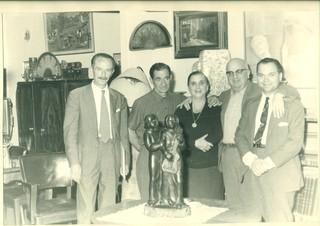DR. EMILIO AZZARINI
| Dr. Emilio Azzarini | DR. EMILIO AZZARINI |
Dr. Emilio Azzarini was born in Punta Alta, Provincia de Buenos Aires, in 1903. Later the family moved to the city of La Plata.
He graduated as veterinary doctor at the National University of La Plata (Universidad Nacional de La Plata) where he worked as Secretary of Pubblication and Main Clerk. He was also member of the Committee for the University Theatre, directed by Antonio Cunill Cabanellas. He excelled in his profession: his high-level scientific work in the field of genetics and artificial insemination had a very favourable reception in the specialized fields in Argentine, England and France.
As a Secretary of Publication he helped in the edition of Facundo (by D. F. Sarmiento) and in a review of the Dogma Socialista by Esteban Echeverría. At the moment of his death he was preparing a book on the cultural activities done within the scope of the University of La Plata since its foundation, and especially on the role played by students in their different organizations; to that purpose he gathered the best collection of student periodicals, nowadays found at the museum.
Though he was a scientific by profession he had music in his blood. The choir of the School of Engineering and the University Choir were created in 1941 and 1942 respectively, due to his iniciative and tireless effort. But where his devotion to music was best reflected was in his unique and vast collection of instruments from all over the world.
He had started to collect musical instruments books and scores (that he gathered and classified) since he was sixteen. Thanks to his interest, he rescued from oblivion very valuable pieces abandoned in private house or shops. He received many musical instruments in payment for this veterinary service and got others in antique shops or through friends who travelled abroad.
This could be well demonstrated by a vast documentary evidence of Dr. Azzarini's mail filed at the museum. The exampje that follows is perhaps the most curious: Javier Villafane, puppeteer and a friend of Azzarini's travelled to China with a special request from his friend: to get a ko ling (pigeon whistle). The search throughout China was futile: the small musical instrument had undergone such a process of acculturation that no trace of it was found in its country of origin. Finally through a contact with the Institute of Music of Peking, two specimens were found in the Gobi Desert, one of which is now at the museum.
Dr. Emilio Azzarini died to early, on February 14 th, 1963. He still had too much to do and offer. He left us his collection of musical instruments, mirror of his life.







